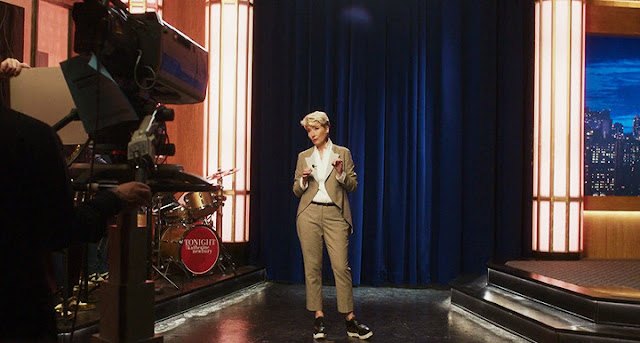"I'm so happy I feel sick."

Writer/producer Mindy Kaling's latest workplace comedy, Late Night, tries to juggle a lot of seemingly high concepts about diversity/inclusivity, female empowerment, toxic work environments, and the rarely seen politics of making comedy. The always winning Emma Thompson stars as an iconic talk show comedian, Katherine Newbury, who's forced to hire a woman of colour, Kaling's Molly, to help combat the complacency of her declining work.
Director Nisha Ganatra has a rote house style more interested in focusing on the character interactions than recreating the magical feeling of creating a nightly television show. Unfortunately and despite so many promising elements, what almost sinks the uneven film is so many competing, contradictory elements that make it hard to enjoy the natural talents of its cast and Kaling's trademark wit for the material.
We must accept that Newbury was somehow able to cement her status as a network late night talk show icon for twenty-eight years due to a David Letterman style dedication to excellence at all costs yet the quality of her show has severely suffered over the last decade due to irrelevance as she basically has nothing to do with her staff or writers while still resisting hiring any women or non-white men thanks to internalized sexism.

Kaling and Ganatra flirt with conventional romantic comedy elements in the form of Hugh Dancy and Reid Scott's stand-up and writer characters as they both play slightly different versions of the same rom-com love interest archetype. That's quickly abandoned for a late third act revelation and so many unnecessary plot points that drag the Devil Wears Prada style face-off between Molly and Katherine down.
Another tough impediment for the film is the actual dramatized comedy bits themselves shown within the film are painfully unfunny when they're supposed to be hilarious. It's no coincidence no one immediately involved in the film came from that very specific television culture of late night comedy or, alternatively, the stand-up world.
None of the monologue jokes, sketches, or "viral" videos are believably funny. Some of the guest interactions are awkward and the whole late night talk show aesthetic never feels real unlike the genuine dialogue scenes in the writers' room or the protégé/mentor relationship between Kaling and Thompson.
Late Night expresses both the fantasy of progress in the workplace with the crushing realities of inequality in the entertainment industry. The comedic material Kaling mines is ripe but there are far too many underdeveloped plot buy-ins that frankly don't matter and tediously sidetrack the real focus of the winning non-romantic relationship at its core.
More | YVArcade / AV Club / Slashfilm / The Playlist / Vox







0 reactions:
Post a Comment